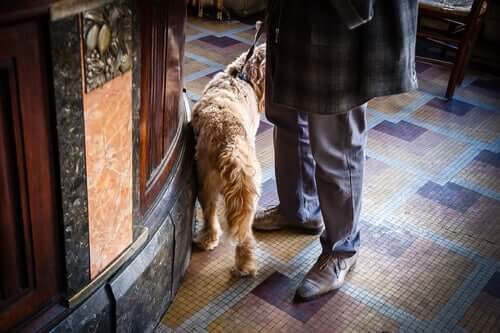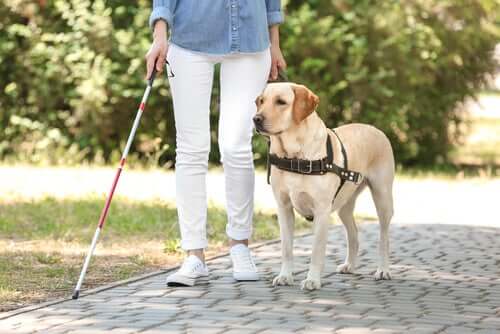Regulations for Dogs in Public Establishments


Written and verified by the lawyer Francisco María García
Fortunately for dog owners, more and more public establishments are opting to adopt pet-friendly policies. What this means is that you don’t have to leave yours at home when you go out. Instead, you can now bring them along into bars, restaurants, shops, stores, etc. It’s important that you know the regulations on dogs in public establishments. In this way you’ll be able to understand not only your rights as a pet owner, but also the limits and conditions that you and your pets must observe in public areas.
Dogs in public establishments – are there federal laws?
Unfortunately, there’s still no national legislation in regard to the presence of dogs in public establishments. But, in February 2017, Michigan legislators introduced bill S.B. 122/H.B. 4187. It allows food service establishments to permit dogs in their outdoor dining areas.
Currently, there are about 11 states that have some sort of law on this. Note that there may be other laws in addition to state law. For instance, cities and counties can enact their own laws in regard to dogs in public establishments. The only exceptions are where state law prohibits this entirely. New Hampshire is one of these states.
Oftentimes, state legislatures feel that local governments are better equipped to deal with such issues. This is because those electors understand the unique character and attitudes of their own cities and counties. Administrative regulations dealing with public health may also affect the legality of bringing a dog to a restaurant.
Additionally, you should know that these laws don’t apply to service animals. As defined by federal law, service animals such as dogs, and sometimes even miniature horses who do work or perform tasks for individuals with disabilities, are allowed in public establishments.
This basically refers to government buildings or public places like a business, a museum, a hotel, or a restaurant. The only reason people wouldn’t allow this is if the service animals disrupted the business in some way. There are other exceptions to the federal law in food storage or preparation areas.
Local regulations and limitations on dogs in public establishments

Even though local regulations can encourage the creation of pet-friendly spaces, it’s still up to the managers to establish any conditions that may hinder or limit the presence of animals in their businesses.
Thus, the presence of dogs in these establishments ends up depending, many times, on the decision of the business owner. However, keep in mind that some communities already have ordinances to promote the presence of dogs in public and private establishments.
The objective is to offer more legal options for owners to frequent more public establishments with their dogs. At the same time, it’s about defining the specific circumstances in which a manager can use regional regulations to limit or prevent the entry of animals into their business.
Leading by example
Florida may have been the first state to enact a law on dogs in restaurants in 2006. The law allows a local unit of government to adopt an ordinance that acts as an exemption to the state’s Food and Drug Administration Food Code. Once the local exemption is passed, a restaurant can apply for a permit to allow dogs in the outdoor dining spaces.
“Pets may have limited access to hotels, restaurants, bars, taverns and other public establishments where drinks and meals are consumed when the owner of the establishment determines the specific conditions of admission, prior administrative authorization by the competent body. In this case, they must show a sign indicating it, visible from outside the establishment.”
As you can see, dog owners must request an administrative authorization. They would have to present their arguments according to current regulations if a business tries to limit your pet’s access. Throughout the process, and when you obtain authorization, an establishment must display a sign at its entrance.
Note that the same regulations define that the entry of animals is prohibited in establishments that manufacture, sell, store or transport food. It also provides for the prohibition or limitation of access with pets to sports facilities, public shows, and other similar public establishments.
Guide dogs in public establishments

There are some exceptions in regard to service animals being in public establishments. A business can’t prevent them from entering. This is true even in businesses involved in the production or sale of food, or in public events and sports celebrations.
Additionally, note that these kinds of dogs must be properly trained. Companion animals who offer emotional support, therapy, or comfort aren’t exactly “service animals” under the Americans with Disabilities Act. These terms mainly describe animals that provide comfort just by being with a person.
However, because they’re not trained to perform a specific job or task, they don’t legally qualify as service animals. However, some state or local governments have laws that allow people to take emotional support animals into public places. You may check with your state and local government agencies to find out more about these laws.
More and more people are taking their pets along wherever they go so it’s great to know that they can now be in some public establishments. Not only is it a great business move as dog people like to go out and spend money, but businesses immediately become trendy just by joining the pet-friendly community.
You may not know it but this movement is becoming stronger every day. Not only in the USA, but also at an international level. Thanks for reading.
Fortunately for dog owners, more and more public establishments are opting to adopt pet-friendly policies. What this means is that you don’t have to leave yours at home when you go out. Instead, you can now bring them along into bars, restaurants, shops, stores, etc. It’s important that you know the regulations on dogs in public establishments. In this way you’ll be able to understand not only your rights as a pet owner, but also the limits and conditions that you and your pets must observe in public areas.
Dogs in public establishments – are there federal laws?
Unfortunately, there’s still no national legislation in regard to the presence of dogs in public establishments. But, in February 2017, Michigan legislators introduced bill S.B. 122/H.B. 4187. It allows food service establishments to permit dogs in their outdoor dining areas.
Currently, there are about 11 states that have some sort of law on this. Note that there may be other laws in addition to state law. For instance, cities and counties can enact their own laws in regard to dogs in public establishments. The only exceptions are where state law prohibits this entirely. New Hampshire is one of these states.
Oftentimes, state legislatures feel that local governments are better equipped to deal with such issues. This is because those electors understand the unique character and attitudes of their own cities and counties. Administrative regulations dealing with public health may also affect the legality of bringing a dog to a restaurant.
Additionally, you should know that these laws don’t apply to service animals. As defined by federal law, service animals such as dogs, and sometimes even miniature horses who do work or perform tasks for individuals with disabilities, are allowed in public establishments.
This basically refers to government buildings or public places like a business, a museum, a hotel, or a restaurant. The only reason people wouldn’t allow this is if the service animals disrupted the business in some way. There are other exceptions to the federal law in food storage or preparation areas.
Local regulations and limitations on dogs in public establishments

Even though local regulations can encourage the creation of pet-friendly spaces, it’s still up to the managers to establish any conditions that may hinder or limit the presence of animals in their businesses.
Thus, the presence of dogs in these establishments ends up depending, many times, on the decision of the business owner. However, keep in mind that some communities already have ordinances to promote the presence of dogs in public and private establishments.
The objective is to offer more legal options for owners to frequent more public establishments with their dogs. At the same time, it’s about defining the specific circumstances in which a manager can use regional regulations to limit or prevent the entry of animals into their business.
Leading by example
Florida may have been the first state to enact a law on dogs in restaurants in 2006. The law allows a local unit of government to adopt an ordinance that acts as an exemption to the state’s Food and Drug Administration Food Code. Once the local exemption is passed, a restaurant can apply for a permit to allow dogs in the outdoor dining spaces.
“Pets may have limited access to hotels, restaurants, bars, taverns and other public establishments where drinks and meals are consumed when the owner of the establishment determines the specific conditions of admission, prior administrative authorization by the competent body. In this case, they must show a sign indicating it, visible from outside the establishment.”
As you can see, dog owners must request an administrative authorization. They would have to present their arguments according to current regulations if a business tries to limit your pet’s access. Throughout the process, and when you obtain authorization, an establishment must display a sign at its entrance.
Note that the same regulations define that the entry of animals is prohibited in establishments that manufacture, sell, store or transport food. It also provides for the prohibition or limitation of access with pets to sports facilities, public shows, and other similar public establishments.
Guide dogs in public establishments

There are some exceptions in regard to service animals being in public establishments. A business can’t prevent them from entering. This is true even in businesses involved in the production or sale of food, or in public events and sports celebrations.
Additionally, note that these kinds of dogs must be properly trained. Companion animals who offer emotional support, therapy, or comfort aren’t exactly “service animals” under the Americans with Disabilities Act. These terms mainly describe animals that provide comfort just by being with a person.
However, because they’re not trained to perform a specific job or task, they don’t legally qualify as service animals. However, some state or local governments have laws that allow people to take emotional support animals into public places. You may check with your state and local government agencies to find out more about these laws.
More and more people are taking their pets along wherever they go so it’s great to know that they can now be in some public establishments. Not only is it a great business move as dog people like to go out and spend money, but businesses immediately become trendy just by joining the pet-friendly community.
You may not know it but this movement is becoming stronger every day. Not only in the USA, but also at an international level. Thanks for reading.
All cited sources were thoroughly reviewed by our team to ensure their quality, reliability, currency, and validity. The bibliography of this article was considered reliable and of academic or scientific accuracy.
- apadan.org. Con tu perro, donde tú quieras. Extraído de: http://www.apadan.org/sites/default/files/Con%20tu%20perro.pdf
- LEY 11/2003, de 24 de noviembre, de Protección de los Animales. Extraído de: https://www.juntadeandalucia.es/export/drupaljda/1337163415TL_30.pdf
This text is provided for informational purposes only and does not replace consultation with a professional. If in doubt, consult your specialist.








